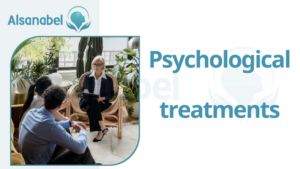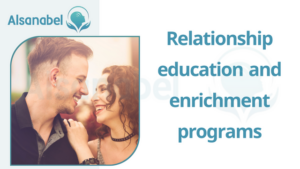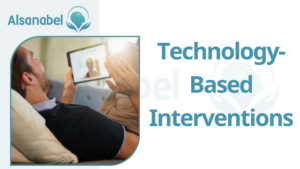Psychological Treatment To Improve Relationships 2024
- Category ADHD
Table of Contents
ToggleWhat is Psychological Treatment to Improve Relationships?
Psychological treatment to improve relationships involves a trained therapist who helps clients identify negative patterns and behaviors within their relationships. The therapist provides an objective and safe space where clients can express their concerns and receive guidance on how to address them effectively.
The therapist helps clients to understand how negative emotions, such as anger or fear, can interfere with communication and lead to misinterpretations. Through various techniques, such as talking through scenarios and role-playing, the therapist helps clients develop healthier emotional responses and communication styles.
Benefits of Psychological Treatment to Improve Relationships
Therapy can improve relationships in numerous ways. It helps individuals to develop a better understanding of themselves and their partners, to identify and address destructive behaviors, to enhance communication, and build stronger bonds.
Some of the benefits of psychological treatment to improve relationships include:
- Better communication skills
- Improved problem-solving abilities
- Deeper understanding of oneself and one’s partner
- Increased satisfaction in the relationship
- More effective conflict resolution skills
- Greater emotional intimacy
Overall, psychological treatment to improve relationships can help individuals and couples develop healthier and more fulfilling relationships. It provides a safe space to discuss difficult emotions, increase self-awareness, and acquire the necessary tools to maintain healthy relationships.
Psychological treatments
Psychological treatment to improve relationships can take various forms, depending on the individual’s needs and situation. Some of the most commonly used types of psychological treatments for relationships are Cognitive Behavioral Therapy (CBT), Emotionally Focused Therapy (EFT), and Dialectical Behavioral Therapy (DBT).

CBT is a short-term therapy approach that focuses on addressing negative thought patterns and improving communication skills. The therapist helps clients understand the connection between thoughts, feelings, and actions, and identify distortions in their thinking that can negatively impact their relationships. In this way, individuals can learn more effective and positive problem-solving strategies.
Alternatively, EFT is a form of therapy that prioritizes emotional connection and intimacy between partners. The therapist helps individuals develop greater emotional awareness and express themselves in a healthier manner. Through this approach, clients can develop stronger bonds and deepen their understanding of one another.
Lastly, DBT can be beneficial for individuals who struggle with intense emotions that can negatively impact their relationships. The therapy teaches individuals emotional regulation skills, distress tolerance, and mindfulness to help them manage their emotions more effectively. Additionally, individuals learn to communicate their emotions in a healthier and more productive way.
Communication Skills Training
Communication Skills Training is an effective psychological treatment that can help improve relationships. The therapist helps individuals and couples develop the skills they need to communicate effectively and build stronger connections. This treatment can take various forms, ranging from group training to individual therapy sessions.
Effective Communication and Relationship Improvement are the key goals of communication skills training. The therapist helps clients learn how to express their thoughts and feelings openly and honestly. They also learn how to actively listen to their partners and respond appropriately. By developing these skills, individuals can build trust, understanding, and intimacy in their relationships.
Using “I” Statements and Active Listening are some of the most commonly used techniques in communication skills training. “I” Statements are a way of communicating that focuses on the speaker’s feelings and needs, rather than blaming the other person. Active Listening involves giving your partner your full attention and responding to what they are saying, rather than interrupting or criticizing them.
During communication skills training, couples learn how to identify negative communication patterns and replace them with more productive ones. They also learn how to resolve conflicts in a healthy and respectful way. By addressing these issues in a safe and objective space, couples can develop stronger emotional bonds and build more fulfilling relationships.
Conflict Resolution Skills Training
Conflict Resolution Skills Training is a form of therapy that can help individuals and couples develop healthy communication and problem-solving skills. The goal of this type of therapy is to teach clients how to resolve conflicts in a mutually beneficial way, without resorting to abusive or hurtful behavior.
During this type of therapy, clients learn how to identify negative patterns of interaction that can lead to conflicts. These patterns may include blaming, criticism, and defensiveness. By understanding these patterns, individuals can begin to break the cycle of negative communication and work towards more positive interactions.
Developing positive strategies to resolve disagreements is another key goal of conflict resolution skills training. Clients learn how to communicate their needs and desires effectively, while also listening actively to their partners. They also learn how to negotiate and compromise in a way that is respectful and fair.
One technique commonly used in conflict resolution skills training is called the XYZ method. This method involves identifying the behavior that is causing the conflict, expressing how that behavior makes the individual feel, and suggesting a positive alternative that can lead to a resolution.
Another technique used during this type of therapy is called “fair fighting.” This involves setting ground rules for discussions and disagreements, such as avoiding personal attacks and taking a break if needed. By following these guidelines, couples can work through their issues in a healthy and constructive way.
Relationship education and enrichment programs
Relationship education and enrichment programs are therapeutic interventions that aim to improve communication and overall dynamic between couples. These programs range from premarital counseling to workshops and even coaching sessions.

Premarital counseling is a form of therapy that aims to equip couples with the necessary tools to build strong and healthy relationships. During sessions, couples learn how to communicate effectively, resolve conflicts, and build emotional connections. The counselor may also address specific issues or concerns that are unique to the couple’s relationship, such as finances or family planning.
Couple workshops, on the other hand, are group sessions that allow couples to connect with others who are facing similar struggles. The workshops focus on developing skills that are crucial in maintaining healthy relationships, such as active listening, empathy, and conflict resolution.
Relationship coaching is another option for couples who are looking to improve their relationship. Relationship coaches work with the couple to identify areas of concern and create an action plan for improvement. These sessions may focus on communication, intimacy, or other factors that are specific to the couple’s relationship.
Family therapy
Family therapy is a type of counseling that focuses on improving communication and dynamics within a family. It is often used to address conflicts and misunderstandings that may arise between family members. Family therapy can be helpful for families facing a variety of challenges, such as divorce, blended family issues, or mental health concerns within the family.
The main goal of family therapy is to help families develop healthy communication skills and improve their overall dynamic. By working with a therapist, families can better understand each other’s perspectives and learn how to resolve conflicts in a constructive manner.
One of the key benefits of family therapy is that it helps families develop a greater sense of empathy and understanding for each other’s feelings and experiences. Through therapy, family members can learn to listen more effectively and respond to each other in ways that are supportive and respectful.
Another important goal of family therapy is to address specific issues or concerns that are unique to the family. For example, a family therapist may work with a blended family to help them navigate the challenges of bringing two families together. Alternatively, a therapist may help a family facing mental health issues to develop coping strategies and support systems for everyone involved.
Mindfulness-Based Interventions
Mindfulness-based interventions are becoming increasingly popular in the field of therapy, particularly for couples or families seeking to improve their relationships. The use of mindfulness in therapy can help individuals develop greater awareness of their thoughts, feelings, and behaviors, which can lead to more positive interactions with others.
Benefits of Mindfulness for Relationship Improvement
Research has shown that mindfulness can have a positive impact on relationships by promoting emotional regulation, empathy, and effective communication. Engaging in mindfulness practices can help individuals better understand and manage their own emotions, which can in turn lead to more effective communication and deeper empathy for their partner or family members.
Mindfulness Practices for Couples
A common mindfulness practice for couples is simply paying attention to each other in an open and non-judgmental way. This can involve actively listening to one another, fully engaging in conversations, and taking the time to understand each other’s perspectives.
Another mindfulness practice that can help improve relationships is body-awareness exercises, such as deep breathing or progressive muscle relaxation. These practices can help reduce stress and tension, allowing individuals to approach their relationships from a more calm and centered perspective.
Additional mindfulness exercises that can be effective for couples or families include meditation, visualization, and journaling. These practices can help individuals develop greater insight into their own emotions and behaviors, which can lead to more effective communication and healthier relationships overall.
Technology-Based Interventions

Online Programs for Relationship Improvement
In addition to mindfulness-based interventions, technology-based interventions have also gained popularity in recent years. Online programs, in particular, have emerged as a convenient and accessible option for couples or individuals seeking to improve their relationships.
Online programs typically offer modules or modules of information and exercises designed to address specific relationship issues, such as communication, conflict resolution, and intimacy. These programs can be completed at the couple’s own pace, from the comfort of their own home.
Research has shown that online programs can be effective in improving relationship satisfaction and reducing conflicts. Additionally, they may offer a more cost-effective and convenient alternative to traditional therapy sessions.
Mobile Applications for Couples
Mobile applications, or apps, have also emerged as a potential tool for improving relationships. Many apps offer features such as mood tracking, shared calendars, and communication tools designed to enhance couples’ connection and reduce conflicts.
One popular app, for example, encourages couples to take a daily 5-minute “challenge” aimed at promoting positive interactions, such as expressing gratitude, giving compliments, or engaging in playful competitions. Another app allows couples to track and share their love languages, with suggested activities and prompts for each language.
While research on the effectiveness of these apps is still limited, they may offer a convenient and accessible way for couples to strengthen their relationship skills.









